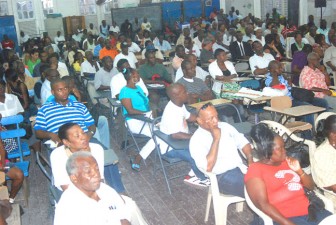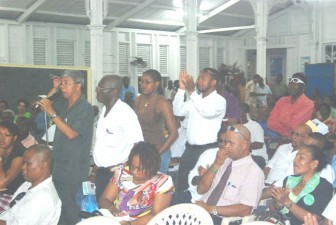The PNCR’s militancy or lack thereof was among the hot button issues at last evening’s public meeting in the city, where four of the party’s five presidential aspirants face down concerns that it had gone dormant.
As part of a month-long series of engagements geared to sell their messages and the party to the populace, retired army Brigadier David Granger, former minister Dr. Faith Harding, attorney James Bond and former finance minister and economist Carl Greenidge faced off at a well-attended public meeting at the St. George’s Secondary School. Absent was party Vice-Chairman Basil Williams, who is currently overseas.

On the issue of militancy, one attendee labelled the party in its current form “a pussy cat hiding under a chair.” According to him, the only language the current administration understands is confrontation. He queried what the candidate would do to return militancy to the party, to rousing applause from the rest of the audience.
Bond stated that the exuberance displayed by the crowd was answer that the people were ready and willing to be militant again. “I did not get involved in a dead PNCR, when Mr. Winston Murray brought me in this it was alive and well and kicking but it needs a little help and the help the young people are willing to give, don’t be fooled, the young people’s energy is what you need. You want militancy. You want vibrancy. We’re going to give you more than the PPP could handle,” he said to cheers.
But Granger, the former army chief, differed with the perception that the PNCR had gone docile, saying it was not “a pussy cat party.” “Walking down Regent Street is not the only sign of militancy. I think if you were able to come out into the fields with us, into what is happening in Queenstown, into Corriverton, into Manchester, into Hopetown, you would see a very vibrant party. The party doesn’t only exist in Regent Street, it exists throughout all of these regions and they’re very strong, the people are very alert and people have been very energised even electrified by this process.”
However, he agreed with the observation that militancy works with the government and highlighted the case of activist Mark Benschop and columnist Freddie Kissoon protesting the conditions at the city dumpsite. “… The very next day you had two ministers of the government descending on … a gangrene, a running sore that has been affecting people of Wortmanville for over 10 years. So militancy well-placed, well-timed can work so I agree … but the PNC is not asleep and we mustn’t mistake our failure to launch large demonstrations with our lack of militancy; the two are separate and we are very militant….”
Meanwhile, Dr. Harding said she agreed with the need for militancy while adding that this could be displayed in several ways. “This whole nation could decide that they will not leave their home for one or two days a week, stay home and stop everything from happening to get your messages out. It may not be marching but militancy is needed yes.”

Greenidge, for his part, said it was clear that the party needed to be alert and timely with its responses in opposition to what the government is doing. “In militancy, I think it’s important that you don’t give away your hand early by signaling that you will never come out on the streets or that you would not be militant. The trick here is to hold your powers and to use them when appropriate at the point in time when you can be most effective,” he posited.
New party leader
Meanwhile, the nominees were also asked their views on the party leader and the presidential candidate being different individuals in the context of the party winning or losing the elections Incumbent leader Robert Corbin, in signaling he was not returning as the party’s presidential candidate had said that he would remain the party leader. In answering the question Granger noted that the party had decided on the process which was initiated “democratically” at the General Council and approved by the Central Executive Committee. “There is no problem in my mind about the presidential candidate being separate and distinct from a party leader. The presidential candidate is aiming at the presidency and were he to win he’d be subject to the national Constitution; the party leader is subject to the party constitution, they’re two separate positions and I don’t think that the presidential candidate could be overruled by the party leader …,” he stated.
He pointed out that in the US President Barack Obama was not the leader of the Democratic Party but no one thought the party leader was running the country.
“But in the unlikely event that the party loses, again, the presidential candidate is expected to be the head of the list so he will become the Leader of the Opposition, he will go into the National Assembly and lead …,” Granger said.
Meanwhile, Dr, Harding noted that the party’s Biennial Congress will be held after the February 26 Special Congress, where the candidate will be elected and it was at that forum the party leadership will be voted on. “As the presidential candidate one will have the opportunity to become the leader of the party, that is where the change will take place; that is where we will shake up our party,” she declared.
Greenidge stated that there has been a lot of agonising on the matter and that in his campaigning it was one of the most common issues raised by supporters. It was the nominees’ understanding, he said, that
Corbin would not be seeking re-election as party leader. “At the end of the current term of the leader of the party, there is no intention for the leader to continue that term, there will be, as Faith indicated, an election at which time there will be the opportunity and one would expect the party to make arrangements to unify the two positions so that the confusion and concern can be eliminated.”
Meanwhile, Bond reiterated that the presidential candidate will be the Leader of the Opposition, should the party fall to a fifth successive general elections defeat. He also echoed Granger’s point that the president will have Constitution behind him and could “run the country as he sees fit with his Cabinet.”
The nominees also faced questions on food security, VAT, external debt servicing, ensuring a just society and human rights. The next public meeting is slated for today at the Supply Primary School, East Bank Demerara from 5 pm.





